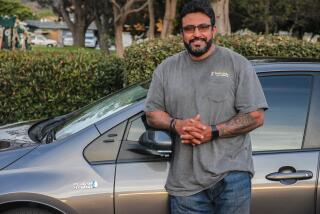Drivers Need More Data on Hybrids
- Share via
A new study by J.D. Power & Associates finds that, despite car makers’ protests that the market is limited, as many as 60% of new-car buyers would be willing to consider a gasoline-electric hybrid vehicle if one were available in the same class of car or truck they had just purchased.
Those consumers also said they want more information about hybrids.
For the record:
12:00 a.m. March 16, 2002 FOR THE RECORD
Los Angeles Times Saturday March 16, 2002 Home Edition Main News Part A Page 2 A2 Desk 1 inches; 28 words Type of Material: Correction
Vehicle registrations--A chart in Wednesday’s Highway 1 section showing vehicle registrations in California had correct numbers, but the bars representing those numbers were not proportional.
The problem, it appears, isn’t lack of buyer interest but lack of knowledge and the auto makers’ unwillingness, so far, to get a variety of hybrids into the market.
That’s expected to change soon. Honda Motor Co. and Toyota Motor Corp. got the jump on the industry by introducing limited-production hybrids in the U.S. almost two years ago: the two-seat Honda Insight coupe and the five-seat Toyota Prius sedan.
Now Ford Motor Co., General Motors Corp. and the Chrysler Group have promised various types of hybrids in the next few years, and auto makers in Asia and Europe are expected to follow. Honda, in fact, has just introduced its second hybrid--a gas-electric version of the Civic.
J.D. Power analyst Thad Malesh, director of the alternative power technology practice at the Agoura Hills consultancy, said hybrid sales in the U.S. should approach 500,000 vehicles a year shortly after mid-decade.
“We expect to see as many as 20 hybrid vehicle models, including cars, trucks and SUVs,” he said.
So it’s good news for car companies that the Power study found that 30% of new-car buyers “definitely” would consider a hybrid gasoline-electric vehicle and that 30% more said a hybrid would be a “strong consideration.”
And respondents to the survey of more than 5,000 recent new-car buyers said that what they want most is a hybrid option in the same segment as their current vehicle.
Nearly all those surveyed selected a mid-size passenger car as their second choice for a hybrid.
Malesh said that by providing Taurus- and Accord-size hybrids, auto makers would be opening up a still-strange concept to millions of mainstream buyers.
How strange? Well, women are much more interested in hybrids than are men, the survey found, but they say there is not enough information to help them understand the technology.
Men who said they were interested also demonstrated a lack of familiarity, often confusing hybrid vehicles with the “small, expensive, limited-range electric vehicles that they saw or heard about in the 1990s,” Malesh said.
“Almost two years after the launch of the first hybrids in the United States, nearly half the survey respondents still incorrectly believe a hybrid vehicle needs to be plugged in to recharge the battery pack,” he said.
A hybrid combines two power plants, usually a gasoline engine and an electric motor. The electric motor boosts the internal- combustion engine, allowing use of a much smaller conventional engine than it takes to move standard versions of the same vehicles. The gas engine powers a generator that produces electricity for the electric motor--some is stored in on-board batteries--so it never has to be plugged in to a stationary charging unit.
In a properly designed hybrid, the performance is similar to that of the conventional version but with vastly improved fuel economy and reduced emissions.
But before hitting the market with all the hybrid vehicles it is promising, the auto industry needs an information campaign to explain what a hybrid is--and what it isn’t.
Confusion about hybrid features, such as gasoline engines that turn off at stoplights and electric motors that serve as superchargers, highlights the need for educational efforts, Malesh says.
Driving the heightened interest in hybrids is the publicity that the inaugural Honda and Toyota efforts have received, as well as consumers’ concerns about the environment, rising fuel prices and U.S. dependence on foreign oil.
The J.D. Power survey also found that although price plays a big part in the hybrid market and that consumers want federal and local subsidies to help keep costs competitive with those of standard vehicles, many are willing to pay a premium for hybrid vehicles.
*
Times staff writer John O’Dell covers the auto industry for Highway 1 and the Business section. He can be reached at john.odell@latimes.com.






